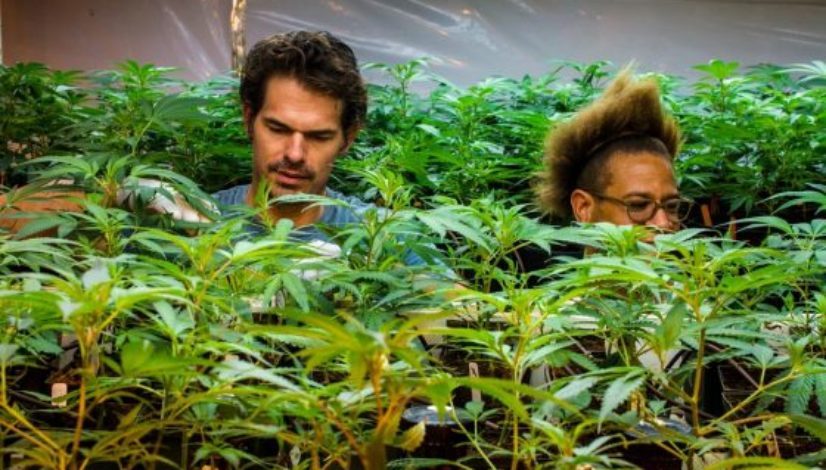More veterans parlaying their military skills into cannabis careers
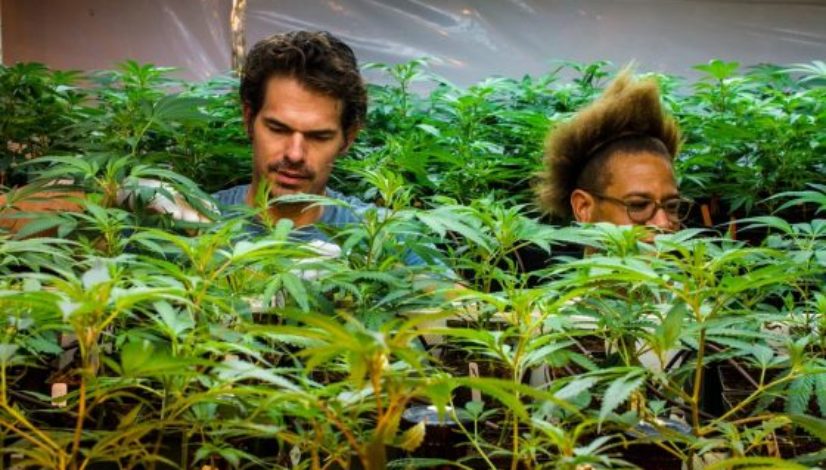
Published: Nov 10, 2017, 10:00 am • Updated: Nov 13, 2017, 8:32 am
By Bruce Kennedy, The Cannabist Staff
Chad Drew considers himself a veteran of not only the Air Force but also the cannabis industry. The 41-year-old is sales manager at the Colorado Harvest Company, a chain of dispensaries in metro Denver.
And he believes his decision to get into legal cannabis as a profession eight years ago, after leaving the service and then finishing college, was helped by his time in the armed forces.
“The military totally played a part in it,” he told The Cannabist, when asked how he got hired. “When you serve, you come from a different cut of cloth. It instills a lot of discipline within you.”
According to a recent American Legion survey, an overwhelming number of veterans support both medical marijuana legalization and further research – as a treatment option for post-traumatic stress disorder (PTSD), chronic pain and other ailments, and as an alternative to prescription pharmaceuticals that have potentially harmful side-effects and addiction risks.
But that support of cannabis by veterans extends beyond politics and into the workplace, especially when it comes to job creation.
A growing number of veterans are finding positions in the legal cannabis sector once they leave the service – and many are finding the skills they developed in the military are welcome within the industry.
Why weed jobs are a good fit
One of the more obvious job positions for veterans is to work within the armed security side of the cannabis market. Due to federal prohibitions, many banks and financial institutions refuse to set up accounts for cannabis companies, leading them to operate on a primarily cash basis. So there’s an established network of security firms that are hiring hundreds of veterans to literally ride shotgun on shipments of marijuana and cash, as well as protect dispensaries and grow operations.
A large number of vets are also finding cannabis cultivation, production and retail operations to be a good fit for both their skill-set and temperament when it comes to work.
Chris Driessen is president of OrganaBrands, the Denver-based parent company for some well-known vaping, edibles and concentrate brands such as O.penVape, Bakked and District Edibles. The company currently has licensees in 11 states, employing 250 people nationwide. And about 10 percent of those employees are veterans, according to Driessen.
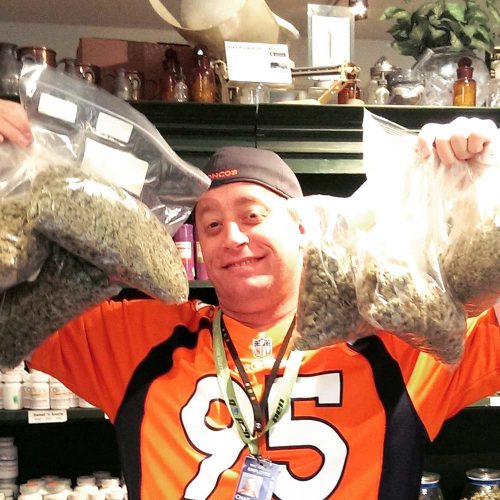 Air Force veteran Chad Drew has been working for Colorado Harvest Company since January 2014. He’s currently a sales manager. (Courtesy of Chad Drew)
Air Force veteran Chad Drew has been working for Colorado Harvest Company since January 2014. He’s currently a sales manager. (Courtesy of Chad Drew)
“The veteran community pairs so well (with our business), regardless of the branch of armed forces you’re in,” he told The Cannabist.
And veterans can be ideal employees, he observed, for the detail-oriented work found in many cannabis grow operations or in jobs such as monitoring dispensary inventory.
“(As a veteran) you learned systems, you learned processes, you learned chain of command,” he said. “The fact that we don’t have to train people on some of those things — about work ethic and respect and doing what you say you’re going to do… is a huge benefit for any company, and of course ours as well.”
Cannabis job training for veterans
At least one cannabis company, meanwhile, has set up a training program specifically for veterans. This past summer THC Design, a California-based cannabis breeding and cultivation firm, launched a paid internship and mentoring program for veterans.
The program includes a 12-week course that gives vets hands-on experience while learning from growers, strain breeders, trimmers, engineers and others directly involved with the cultivation of cannabis.
“In that 12 weeks, they’re able to track a plant from start to finish,” THC Design co-founder Ryan Jennemann told The Cannabist. “They do everything from cutting clones to drying, following the plants through the entire cycle.”
More on working with weed
- Want to start a cannabis business in California? Tips from a recent workshop
- California government on a hiring binge as recreational sales approach
- Can the new cannabis industry in struggling Puerto Rico keep the territory afloat?
- Trending: Why more and more experienced workers want a new career in cannabis
- Secret Service realizes it’s losing too many applicants by banning habitual weed users
Jennemann said none of his current crop of interns has any real background in agriculture. But that kind of know-how wasn’t expected, or necessary, for them to take part in the program.
“What I was hiring for was not experience,” he said. “I was hiring for a work ethic, an ability to handle adversity, an ability to solve problems.”
THC Design has hired several of the veterans it trained, but Jennemann said the program — which is open source and available online — has benefits for the wider cannabis industry as well.
“After those 12 weeks they should have a very good grasp on what cultivation is,” he added, “and they should be able to run a small operation on their own or be very much a value-add to wherever they move.”
Former Navy machinist Michael Garcia, 35, found his calling with THC Design.
“I don’t have to hide who I am. I can just be myself,” Garcia told The Cannifornian, a sister site of The Cannabist.
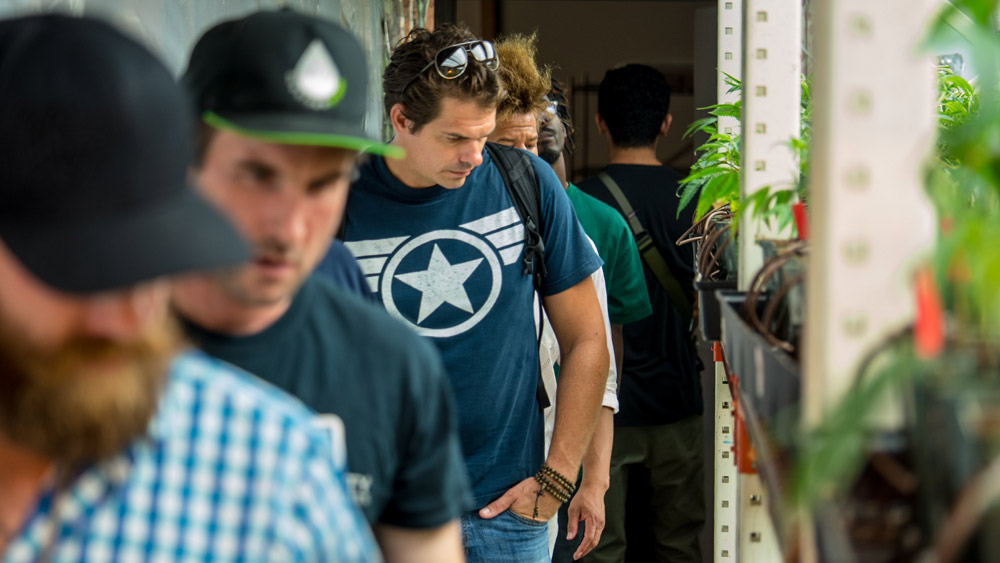 A group of veterans in THC Design’s training program get their first looks at the cultivation room for the California company. (Courtesy of THC Designs)
A group of veterans in THC Design’s training program get their first looks at the cultivation room for the California company. (Courtesy of THC Designs)
OrganaBrands’ Driessen, meanwhile, said his company is in the process of formalizing a hiring program for veterans; a program he expects to be up and running by January.
Veterans, he said, “set themselves apart in the interview. A lot of these folks are, on their own merit, heads and shoulders above their competition.”
There’s another, important factor that is drawing veterans to this career path: interest in medicinal cannabis. An estimated 2.7 million veterans have served in the Iraq and Afghanistan theaters since those conflicts began. And the Veterans Administration reports that up to 20 percent of those Afghanistan and Iraq veterans suffer from PTSD.
Related stories
- NY governor signs bill on Veterans Day to allow medical marijuana for PTSD
- Op-ed: Veterans using medical marijuana in defiance of backward federal policy
- Congress members, veterans join forces in call for medical marijuana reforms
- American Legion poll: Veterans overwhelmingly support medical cannabis research, legalization
- Fears mount for California MMJ patients over “cannabis deserts”
Roger Martin is a veteran who founded Grow for Vets USA, a Las Vegas-based nonprofit that educates veterans about medical cannabis and also gives away donated cannabis to veterans. And he believes that it can be mutually beneficial to have veterans working in the cannabis industry.
“No one understands the importance of reliability better than men and women whose very lives often depended upon being able to count on the person next to them getting the job done,” Martin said in a statement to The Cannabist.
At the same time, he noted, “the healing properties of cannabis are but one factor that makes the cannabis industry so suitable for Veterans. Medical cannabis provides a safe alternative to the deadly prescription drugs that kill more than 18,000 veterans each year. For vets suffering from PTSD, being involved in the cultivation side of the industry can often ease symptoms by providing a point of focus, something other than the negativity that many PTSD sufferers deal with.”
The Colorado Harvest Company’s Drew has also seen how working in cannabis has helped veterans return to the civilian world.
“I think other vets could definitely benefit from working within (the cannabis industry),” he said. “I think the stigma (surrounding marijuana)…is wearing off and I think it’s an accepted medium these days. People are starting to understand that we’re working just as much as anybody else is.”
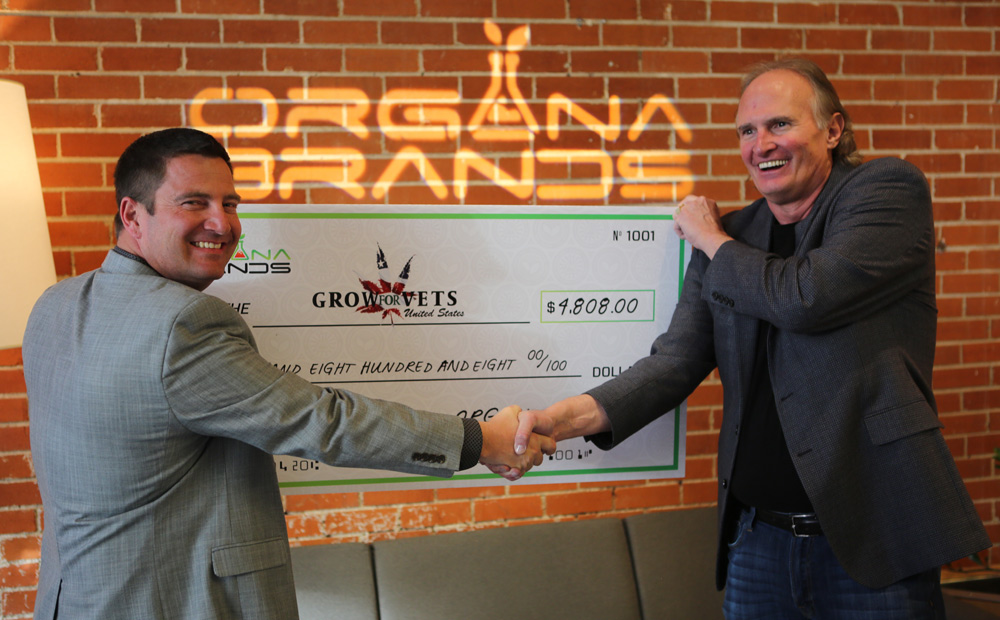 L-R: Chris Driessen of Colorado cannabis company OrganaBrands presents a donation check to Roger Martin, founder of Grow for Vets, a nonprofit that provides resources and donated cannabis to veterans. (Courtesy of OrganaBrands) Topics: California, Colorado, commercial cultivation, industry, jobs, veterans
L-R: Chris Driessen of Colorado cannabis company OrganaBrands presents a donation check to Roger Martin, founder of Grow for Vets, a nonprofit that provides resources and donated cannabis to veterans. (Courtesy of OrganaBrands) Topics: California, Colorado, commercial cultivation, industry, jobs, veterans  Bruce Kennedy
Bruce Kennedy
Bruce Kennedy is a veteran communications professional and multi-media journalist who has years of experience in international and business news. He started covering Colorado’s cannabis industry in…

